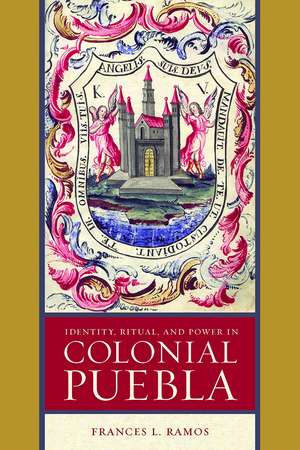Identity, Ritual, and Power in Colonial Puebla
Autor Frances L. Ramosen Limba Engleză Paperback – 27 sep 2012
Located between Mexico City and Veracruz, Puebla has been a political hub since its founding as Puebla de los Ángeles in 1531. Frances L. Ramos’s dynamic and meticulously researched study exposes and explains the many (and often surprising) ways that politics and political culture were forged, tested, and demonstrated through public ceremonies in eighteenth-century Puebla, colonial Mexico’s “second city.”
With Ramos as a guide, we are not only dazzled by the trappings of power—the silk canopies, brocaded robes, and exploding fireworks—but are also witnesses to the public spectacles through which municipal councilmen consolidated local and imperial rule. By sponsoring a wide variety of carefully choreographed rituals, the municipal council made locals into audience, participants, and judges of the city’s tumultuous political life. Public rituals encouraged residents to identify with the Roman Catholic Church, their respective corporations, the Spanish Empire, and their city, but also provided arenas where individuals and groups could vie for power.
As Ramos portrays the royal oath ceremonies, funerary rites, feast-day celebrations, viceregal entrance ceremonies, and Holy Week processions, we have to wonder who paid for these elaborate rituals—and why. Ramos discovers and decodes the intense debates over expenditures for public rituals and finds them to be a central part of ongoing efforts of councilmen to negotiate political relationships. Even with the Spanish Crown’s increasing disapproval of costly public ritual and a worsening economy, Puebla’s councilmen consistently defied all attempts to diminish their importance.
Ramos innovatively employs a wealth of source materials, including council minutes, judicial cases, official correspondence, and printed sermons, to illustrate how public rituals became pivotal in the shaping of Puebla’s complex political culture.
With Ramos as a guide, we are not only dazzled by the trappings of power—the silk canopies, brocaded robes, and exploding fireworks—but are also witnesses to the public spectacles through which municipal councilmen consolidated local and imperial rule. By sponsoring a wide variety of carefully choreographed rituals, the municipal council made locals into audience, participants, and judges of the city’s tumultuous political life. Public rituals encouraged residents to identify with the Roman Catholic Church, their respective corporations, the Spanish Empire, and their city, but also provided arenas where individuals and groups could vie for power.
As Ramos portrays the royal oath ceremonies, funerary rites, feast-day celebrations, viceregal entrance ceremonies, and Holy Week processions, we have to wonder who paid for these elaborate rituals—and why. Ramos discovers and decodes the intense debates over expenditures for public rituals and finds them to be a central part of ongoing efforts of councilmen to negotiate political relationships. Even with the Spanish Crown’s increasing disapproval of costly public ritual and a worsening economy, Puebla’s councilmen consistently defied all attempts to diminish their importance.
Ramos innovatively employs a wealth of source materials, including council minutes, judicial cases, official correspondence, and printed sermons, to illustrate how public rituals became pivotal in the shaping of Puebla’s complex political culture.
Preț: 230.32 lei
Preț vechi: 288.83 lei
-20% Nou
Puncte Express: 345
Preț estimativ în valută:
44.08€ • 45.74$ • 36.84£
44.08€ • 45.74$ • 36.84£
Carte indisponibilă temporar
Doresc să fiu notificat când acest titlu va fi disponibil:
Se trimite...
Preluare comenzi: 021 569.72.76
Specificații
ISBN-13: 9780816521173
ISBN-10: 0816521174
Pagini: 288
Ilustrații: 5 figures, 3 tables
Dimensiuni: 152 x 229 x 23 mm
Greutate: 0.4 kg
Ediția:First Edition
Editura: University of Arizona Press
Colecția University of Arizona Press
ISBN-10: 0816521174
Pagini: 288
Ilustrații: 5 figures, 3 tables
Dimensiuni: 152 x 229 x 23 mm
Greutate: 0.4 kg
Ediția:First Edition
Editura: University of Arizona Press
Colecția University of Arizona Press
Notă biografică
Frances L. Ramos is an assistant professor of Latin American history at the University of South Florida, Tampa.
Cuprins
List of Illustrations
Acknowledgments
Introduction
1 New Spain’s “Second City”
2 Explaining Monarchy in Early Modern Puebla
3 A Reception for a Prince
4 Universal Religion in a Local Context
5 Power, Solidarity, and Diversity in the City of the Angels
6 The Industry of Spectacle
7 Ritual and Conflict: The Political Implications of Ceremonial Disputes, circa 1700 – 1750
8 The Ceremonial Expression of Jurisdictional Tension, 1750 – 1775
Conclusion
Notes
Bibliography
Index
Acknowledgments
Introduction
1 New Spain’s “Second City”
2 Explaining Monarchy in Early Modern Puebla
3 A Reception for a Prince
4 Universal Religion in a Local Context
5 Power, Solidarity, and Diversity in the City of the Angels
6 The Industry of Spectacle
7 Ritual and Conflict: The Political Implications of Ceremonial Disputes, circa 1700 – 1750
8 The Ceremonial Expression of Jurisdictional Tension, 1750 – 1775
Conclusion
Notes
Bibliography
Index
Recenzii
“Identity, Ritual, and Power in Colonial Puebla is a sophisticated and nuanced discussion of the role of ritual in the negotiation and staging of conflicts in eighteenth-century Puebla.” —Javier Villa-Flores, author of Dangerous Speech: A Social History of Blasphemy in Colonial Mexico
"The book is well researched and offers a good historical description of the public and cemonial side of poblano political life in the eighteenth century."—Hispanic American Historical Review
"The book is well researched and offers a good historical description of the public and cemonial side of poblano political life in the eighteenth century."—Hispanic American Historical Review
"Scholars of ritual and colonial Latin America will welcome this fine addition to the historiography."—The Catholic Historical Review
"Ramos presents a sophisticated, complex and meticulously researched narrative that utilises ritual and ceremony as a way to explain the idiosyncrasies of identity and power in New Spain's 'second city.'"—Journal of Latin American Studies
"Ramos presents a sophisticated, complex and meticulously researched narrative that utilises ritual and ceremony as a way to explain the idiosyncrasies of identity and power in New Spain's 'second city.'"—Journal of Latin American Studies
